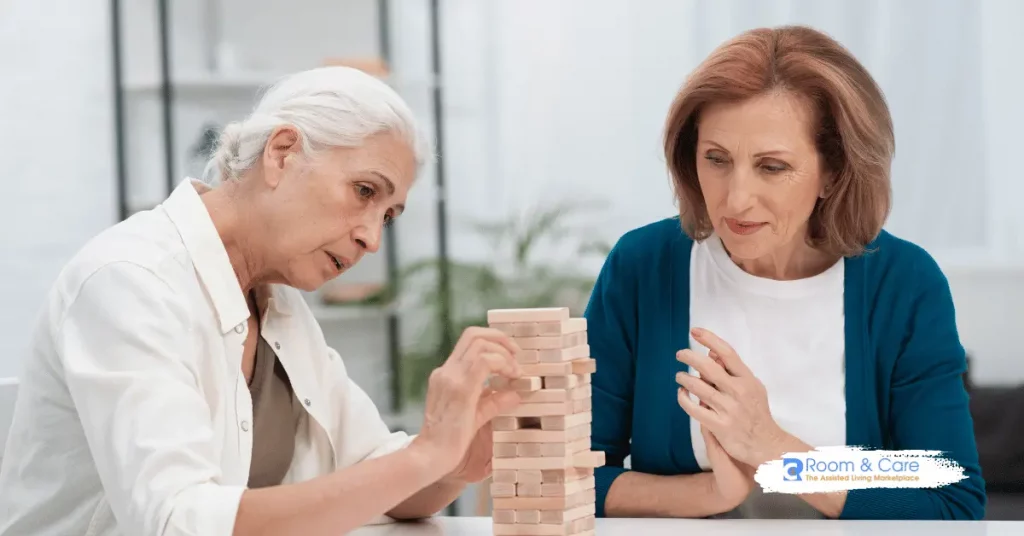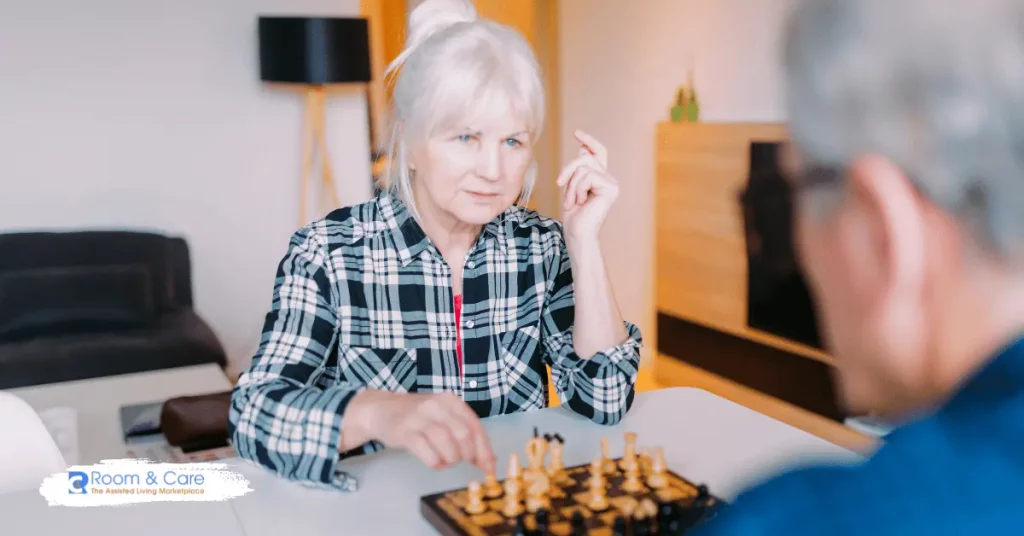

As we grow older, maintaining mental sharpness becomes increasingly essential for leading a fulfilling and independent life. For seniors, staying mentally active is just as important as physical exercise. Engaging in brain games is a fun and effective way to keep the mind alert, improve memory, and enhance problem-solving skills. In this comprehensive guide, we’ll explore the best brain games for seniors and how they can be seamlessly integrated into daily routines, particularly in assisted living facilities, nursing homes, and other senior care environments.
Aging often brings changes in cognitive abilities, such as slower processing speed, reduced memory retention, and difficulty in multitasking. However, just like muscles, the brain can be strengthened with the right exercises. Brain games are designed to challenge the mind, offering a range of cognitive benefits that can help seniors maintain their mental faculties well into their golden years.
Cognitive Enhancement: Regular engagement with brain games helps in improving various cognitive functions such as memory, attention, and reasoning. Studies have shown that seniors who participate in mentally stimulating activities are less likely to experience significant cognitive decline.
Social Interaction: Many brain games can be enjoyed in group settings, providing seniors with the opportunity to interact with peers, share experiences, and form new friendships. Social interaction is crucial for emotional well-being and can prevent feelings of loneliness and isolation.
Mental Resilience: Brain games encourage problem-solving and strategic thinking, which are essential for building mental resilience. These activities challenge seniors to think critically, adapt to new situations, and stay mentally flexible.
Stress Relief: Engaging in enjoyable activities like puzzles or card games can reduce stress and promote relaxation. This is particularly beneficial for seniors who may be dealing with anxiety, depression, or the stress of transitioning into a new living environment.
Sense of Achievement: Completing a challenging game or puzzle provides a sense of accomplishment and boosts self-esteem. This is especially important for seniors who may feel a loss of control in other areas of their lives.
When it comes to choosing the best brain games for seniors, it’s important to consider the individual’s interests, cognitive abilities, and social preferences. Below, we’ve compiled a list of popular brain games that cater to a variety of needs and preferences.
Jigsaw Puzzles: Jigsaw puzzles are a fantastic way to enhance visual-spatial reasoning and problem-solving skills. They require concentration, patience, and the ability to see how pieces fit into the larger picture. Jigsaw puzzles come in various levels of difficulty, making them suitable for all cognitive levels.
Crossword Puzzles: Crosswords are a classic choice for improving vocabulary and word recall. They stimulate the mind by requiring players to think critically about word meanings and relationships. Crosswords can be done individually or as a group activity, making them versatile and accessible.
Sudoku: Sudoku is a popular number puzzle that improves logical thinking and pattern recognition. The game involves placing numbers in a grid based on specific rules, which can range from simple to highly complex. Sudoku is an excellent choice for seniors who enjoy math and problem-solving.

Memory Matching Games: Memory matching games, where players flip cards to find pairs, are great for improving short-term memory and concentration. These games can be played alone or with others, making them ideal for both solitary and social play.
Story Recall Games: Story recall games involve listening to or reading a story and then recalling specific details. This activity helps improve memory retention, attention to detail, and comprehension. It’s a simple yet effective way to keep the mind sharp.
Sequence Memory Games: Games like Simon, where players must repeat a sequence of lights or sounds, are excellent for enhancing working memory. These games challenge seniors to pay close attention and remember sequences, which is a key cognitive skill.
Chess: Chess is a timeless game that requires strategic thinking, planning, and foresight. It’s a mentally stimulating activity that can be played one-on-one or in a group setting. Chess is not only beneficial for cognitive health but also for social interaction and friendly competition.
Checkers: Checkers is a simpler alternative to chess that still offers cognitive benefits such as improved focus, strategic thinking, and planning. The game is easy to learn and can be enjoyed by seniors of all cognitive levels.
Scrabble: Scrabble is a word game that challenges players to create words from a set of letters. It enhances vocabulary, spelling, and strategic thinking. Scrabble is a great way to keep the mind engaged while also enjoying a fun and social activity.
Boggle: Boggle is a fast-paced word game that requires players to find as many words as possible within a grid of letters. This game enhances vocabulary, quick thinking, and pattern recognition. Boggle is ideal for seniors who enjoy a challenge and have a love for words.
Word Search: Word searches are a more relaxed option that helps improve pattern recognition and vocabulary. They are widely accessible and can be adjusted in difficulty to suit different cognitive levels. Word searches are a great way to unwind while still keeping the mind active.
Brain Training Apps: Brain training apps like Lumosity, Peak, and Elevate offer a variety of exercises designed to improve cognitive functions such as memory, attention, and problem-solving. These apps are user-friendly and can be personalized to suit individual needs.
Video Games: Video games that involve problem-solving, strategy, and quick reflexes can be beneficial for cognitive health. Games on platforms like the Nintendo Switch or Wii offer interactive experiences that are both mentally and physically engaging.
Virtual Reality (VR) Games: VR technology is becoming increasingly popular in senior care settings, offering immersive experiences that challenge the mind and provide entertainment. VR games can be particularly beneficial for seniors in assisted living facilities, where they may have limited access to new experiences.
Assisted living facilities and nursing homes are ideal environments for integrating brain games into daily routines. These settings often have the resources and staff to create structured cognitive wellness programs that include a variety of brain games.
Cognitive wellness is a key component of overall health and well-being for seniors. In assisted living facilities and nursing homes, maintaining cognitive health is just as important as managing physical health. Regular engagement in brain games can help slow cognitive decline, improve mental health, and enhance the quality of life for residents.
Game Rooms and Activity Areas: Establishing dedicated spaces for brain games encourages participation and makes these activities a regular part of the day. These rooms can be equipped with a variety of games, from puzzles and board games to digital games and VR technology.
Scheduled Activities: Organizing regular brain game sessions helps ensure that all residents have the opportunity to participate. Group sessions can also foster social connections and create a sense of community within the facility.
Personalized Game Plans: Just as physical activities are tailored to individual needs, brain games can be personalized based on cognitive abilities and interests. This ensures that each resident is both challenged and entertained, leading to better cognitive outcomes.
Training and Support: Staff in assisted living facilities and nursing homes should be trained to understand the cognitive benefits of brain games and how to facilitate these activities. Caregivers play a crucial role in encouraging participation and making sure that games are accessible and enjoyable for all residents.
Monitoring Progress: Regularly tracking residents’ participation and progress in brain games allows caregivers to adjust activities as needed. This helps ensure that each resident is getting the most benefit from the games and can continue to enjoy them as their cognitive needs evolve.

Selecting the right brain games for seniors requires careful consideration of several factors. Here are some tips to help you choose the best options:
Choose games that match the cognitive abilities of the senior. For example, those with mild cognitive impairment may benefit from simpler games like memory matching or word search, while those with stronger cognitive skills might enjoy more challenging options like chess or strategy games.
Games that align with a senior’s personal interests are more likely to engage them. If a senior enjoys words, Scrabble or crossword puzzles might be ideal. If they prefer numbers, Sudoku could be a great choice. Personalizing game selection increases the likelihood of regular participation.
Consider whether the senior prefers solitary activities or enjoys social interaction. Group games like bridge, chess, or Scrabble can provide both cognitive benefits and social engagement, while solitary games like puzzles offer quiet, focused time for personal reflection and mental exercise.
Games should be easy to understand and play, especially for seniors who may struggle with complex rules or technology-based games. It’s important to choose games that are not only mentally stimulating but also accessible and enjoyable.
Incorporating a variety of games into a senior’s routine prevents boredom and provides comprehensive cognitive benefits. A mix of puzzles, word games, strategy games, and digital games keeps the mind engaged in different ways and helps maintain cognitive flexibility.
Q: How frequently should seniors play brain games?
A: Engaging in brain games daily, even for just 15-30 minutes, can provide significant cognitive benefits. Regular practice helps maintain mental sharpness and can improve cognitive functions over time.
Q: Can brain games help prevent dementia?
A: While brain games cannot prevent dementia, they can help delay the onset of symptoms by keeping the mind active and engaged. Regular mental exercise is a key component of cognitive health and can contribute to better outcomes for seniors at risk of cognitive decline.
Q: Are digital brain games better than traditional ones?
A: Both digital and traditional brain games offer unique benefits. Digital games often provide a wider variety of exercises and can be personalized to an individual’s cognitive level, while traditional games like puzzles and board games offer tactile experiences and opportunities for social interaction.
Q: What should I look for in a brain game app for seniors?
A: Look for apps that are user-friendly, offer a variety of games, and allow for adjustable difficulty levels. Apps like Lumosity, Peak, and Elevate are designed specifically to improve cognitive functions and are great options for seniors.
Q: Can brain games be played in group settings?
A: Yes, many brain games are designed for group play, which adds the benefit of social interaction. Group games like chess, Scrabble, and bridge are excellent for fostering connections and creating a sense of community among seniors.
Incorporating brain games into the daily routine of seniors is a simple yet effective way to enhance cognitive health, improve mood, and foster social connections. Whether played individually or in a group setting, these activities offer a wealth of benefits that can contribute to a higher quality of life.
At Room and Care, we recognize the importance of cognitive wellness for seniors. Our platform connects you with the best assisted living facilities, adult family homes, memory care facilities, nursing homes, and independent living communities. We offer these services with no referral fee or middlemen, ensuring you have direct access to the best care options at a lower cost.
Keep your mind sharp, stay engaged, and enjoy the mental benefits that come with playing the best brain games for seniors.